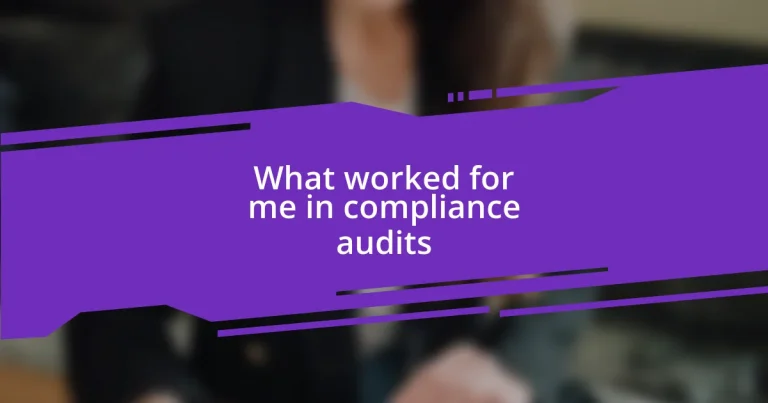Key takeaways:
- Successful compliance audits require thorough preparation, open communication, and effective follow-up to turn challenges into collaborative opportunities.
- Compliance is crucial for risk management, trust building, operational efficiency, and protecting a company’s reputation.
- Team collaboration and an adaptable mindset are essential for overcoming challenges and ensuring continuous improvement after audits.
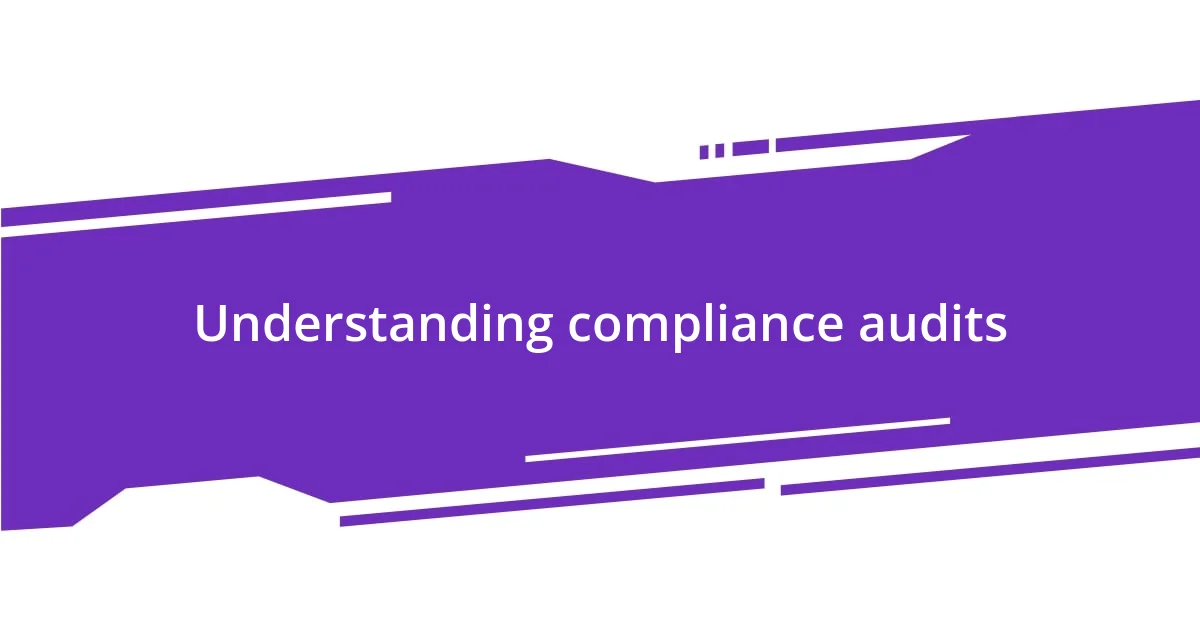
Understanding compliance audits
Compliance audits are thorough examinations of an organization’s adherence to regulatory requirements and internal policies. I still remember my first audit, sitting in a conference room filled with intimidating binders full of policies and procedures; I thought, “How could anyone keep track of all this?” It was an enlightening experience, revealing just how complex compliance can be.
Typically, compliance audits involve reviewing documents, interviewing key staff members, and observing processes to identify potential gaps. I’ve often been surprised by the insights gleaned from talking with team members—they can highlight issues that charts and tables just can’t convey. It made me realize that compliance is not just a checklist; it’s about fostering a culture of accountability and transparency within the organization.
Understanding compliance audits goes beyond knowing what documents to prepare; it’s about recognizing the broader implications for the organization’s integrity and reputation. I learned that a successful audit can affirm your organization’s commitment to ethical practices and build trust with stakeholders. After all, don’t we all want to be part of a company that places value on doing things the right way?
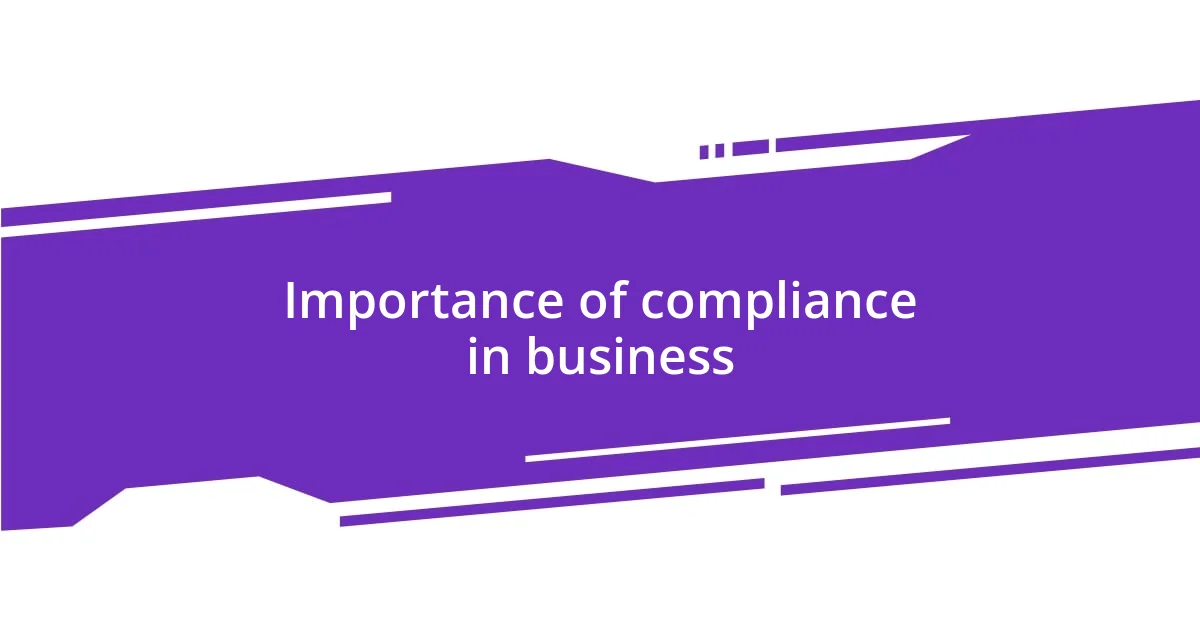
Importance of compliance in business
Compliance plays a crucial role in the health and sustainability of a business. From my experience, being compliant isn’t just about adhering to laws; it’s about creating an ethical foundation that influences every aspect of operations. I recall a scenario where our compliance efforts led to a significant reduction in errors, transforming a previously chaotic audit into a smooth process. That improvement made everyone feel more confident in their roles, showing how compliance isn’t just a necessity, but a source of empowerment.
Here are some key reasons why compliance is vital for businesses:
- Risk Management: Identifies potential legal or financial risks before they escalate.
- Trust Building: Enhances trust among customers, employees, and partners by demonstrating accountability.
- Operational Efficiency: Streamlines processes, reducing errors and improving overall productivity.
- Reputation Protection: Safeguards the company’s reputation by ensuring adherence to ethical standards.
In my view, the importance of compliance cannot be overstated; it directly impacts the company’s overall health and success.
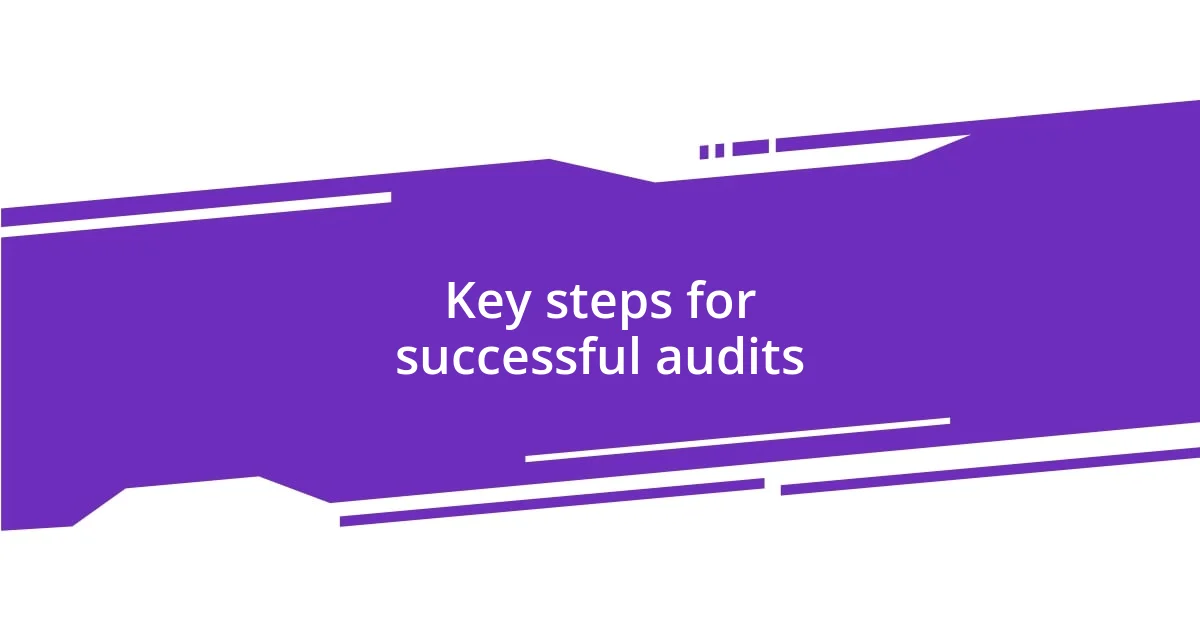
Key steps for successful audits
Successful audits hinge on preparation, which I learned early in my compliance journey. I remember a particularly intense audit where we spent weeks gathering documents and clarifying processes. That initial organization really paid off—it felt like running a marathon, but crossing that finish line was exhilarating. When every team member knows their role and the necessary information is at their fingertips, the audit becomes a collaborative effort rather than a daunting solo task.
Another key step I can’t stress enough is communication. You’ve probably experienced how a common misunderstanding can derail a project. I once faced this issue during an audit when team members had different interpretations of compliance requirements. By encouraging open discussions around expectations and requirements, we aligned our objectives and confidence levels, ultimately leading to a smoother audit experience.
Lastly, follow-up is crucial. I’ve seen how audits yield valuable insights beyond compliance; they often highlight areas for improvement. After an audit, my team and I would sit down to debrief, identifying what went well and what could be improved. It’s not just about identifying gaps; it’s about ensuring continuous growth and adaptation in the organization. These reflections can turn audit experiences into powerful learning opportunities.
| Key Steps | Description |
|---|---|
| Preparation | Gather all necessary documents and clarify processes before the audit. |
| Communication | Encourage open discussions to align expectations among team members. |
| Follow-up | Conduct debrief sessions to reflect and identify improvements post-audit. |
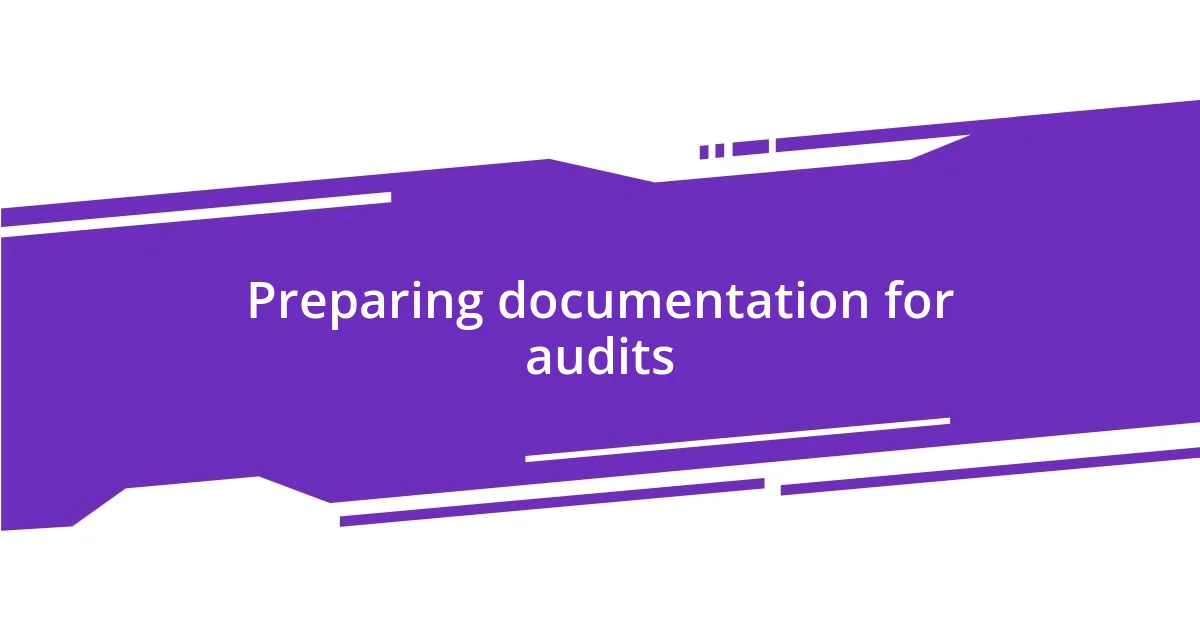
Preparing documentation for audits
To effectively prepare documentation for audits, I always emphasize the importance of starting well in advance. One experience that stands out to me was when we realized just days before an audit that critical documents were missing. Panic set in, but that taught me a valuable lesson: keeping an organized system of records is essential. Now, I ensure everything is systematically filed, so when audit time rolls around, there’s no last-minute scramble.
I’ve also found that creating a checklist tailored to audit requirements can be a game changer. During one particularly complex audit, this simple tool transformed our approach. Each item we ticked off brought a sense of accomplishment and reduced anxiety around what we hadn’t done yet. I often ask myself, what if we hadn’t created that checklist? Would we have overlooked critical information? This reflection instills a sense of gratitude for proactive preparation.
Lastly, gathering feedback from team members who manage various documents is crucial. I made it a habit to have quick discussions with them about what they need and what could be improved. It’s surprising how often they share overlooked details that make all the difference. I remember one team member suggesting we include a summary sheet with key data points, which turned out to be incredibly helpful during the audit. Isn’t it remarkable how collaboration can elevate our performance? This reinforces my belief that everyone’s input matters during the documentation process.
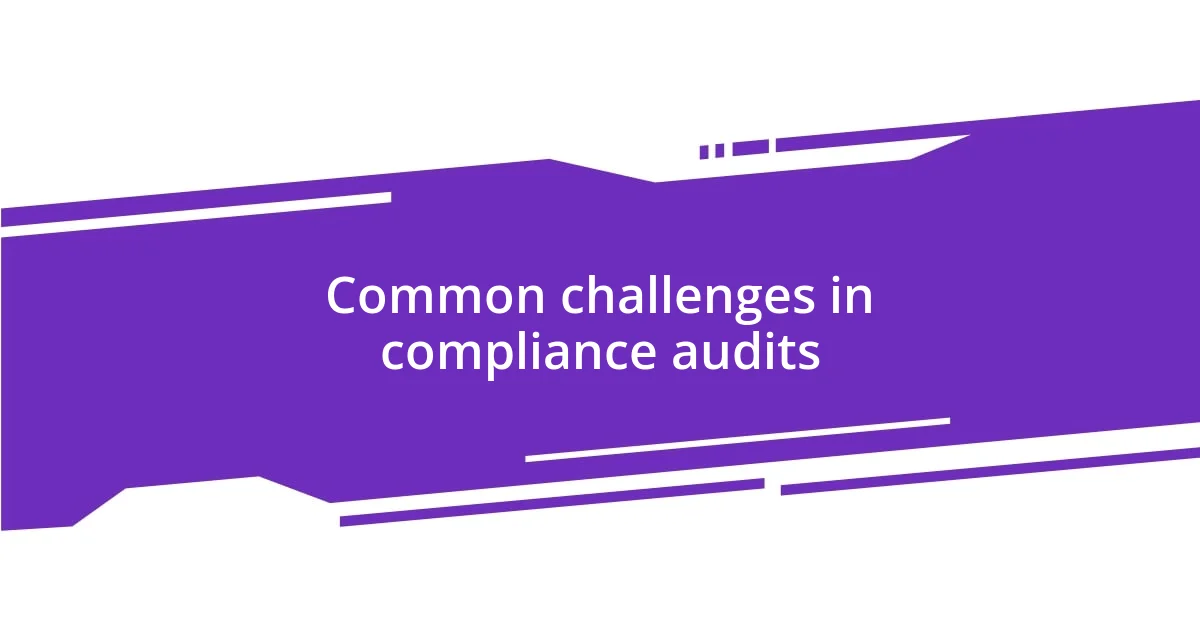
Common challenges in compliance audits
One of the most frustrating challenges I’ve encountered during compliance audits is the inconsistency in data interpretation. During one audit, a colleague and I spent hours deliberating over a specific regulation, each convinced we were correct. This disconnect created unnecessary tension and slowed our progress. It made me realize how essential it is to establish clear definitions of compliance terms upfront. Why do we assume everyone is on the same page? That’s a shortcut I’ve learned to avoid.
I also often face resistance from team members who aren’t fully onboard with compliance requirements. There was a moment in a previous audit when certain departments felt overwhelmed and voiced their concerns, which led to a standoff between teams. What I finally understood is that providing context around why compliance matters can effectively bridge that gap. I started sharing stories of real repercussions faced by organizations that neglected compliance, and suddenly, compliance wasn’t just a box to tick; it became a shared priority.
Moreover, time constraints can be a significant hurdle. I vividly recall an instance where we had only two weeks to prepare for an extensive audit. It felt like trying to fit an elephant into a suitcase! It taught me the importance of early preparation and stress management. When the pressure mounts, it’s crucial to break tasks into manageable pieces and celebrate small wins along the way. Each accomplishment—no matter how tiny—can shift the atmosphere from chaotic to collaborative. Have you ever felt that rush when you finally check off a significant item from your list? That’s what turns audits from stressful events into opportunities for teamwork and growth.
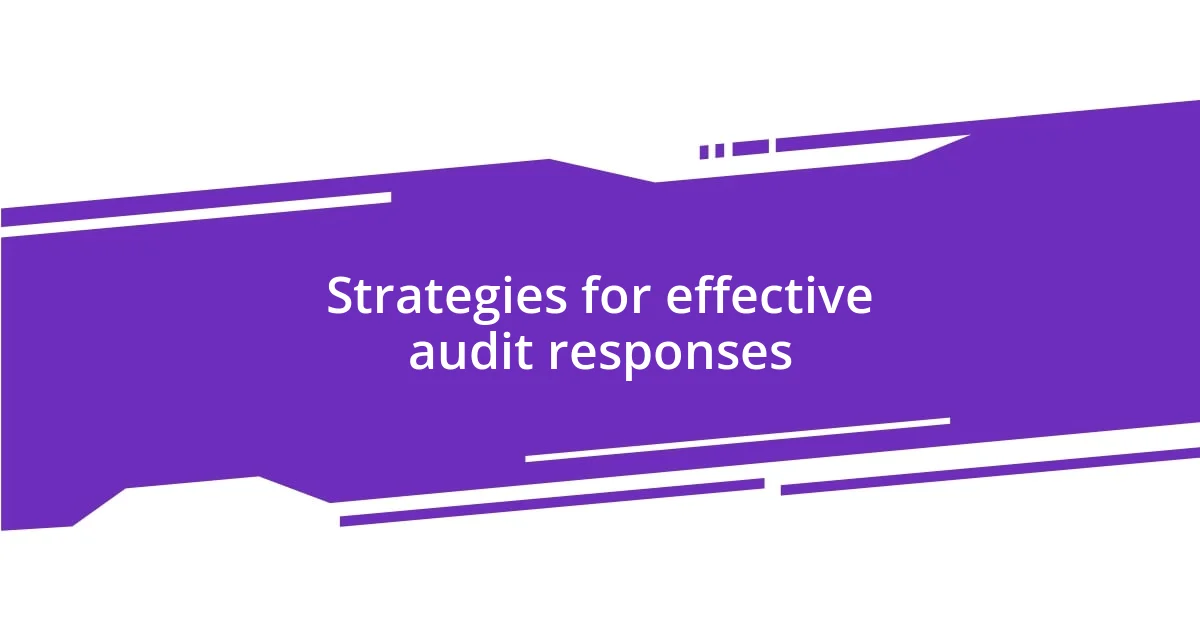
Strategies for effective audit responses
One effective strategy for responding to audit findings is to approach each issue with a solution-oriented mindset. I once dealt with a particularly tough audit where we faced criticism for outdated processes. Instead of defensively arguing our case, we gathered the team and brainstormed improvements. This shift, from defensiveness to proactivity, not only impressed the auditors but also fostered a sense of camaraderie among us. Isn’t it gratifying to turn critiques into collaborative opportunities?
Another aspect I’ve found helpful is maintaining open lines of communication with auditors. I’ve learned that building a rapport can make a world of difference. During one audit, I made it a point to regularly check in with the auditors, sharing updates on our progress. Their feedback was surprisingly constructive, transforming what could have been a confrontational interaction into a cooperative dialogue. Doesn’t it feel good to know that collaboration can lead to better outcomes for everyone involved?
Finally, documenting lessons learned from each audit response is invaluable. After tackling an audit that left us scrambling with last-minute changes, I initiated a post-audit review meeting, allowing the team to reflect on what worked and what didn’t. This practice has since become a cornerstone of our approach, reinforcing a culture of continuous improvement. I often wonder, how much more efficient could we be if we consistently learn from our past experiences? The insight extracted from these reviews empowers us to adapt and respond more effectively in future audits.
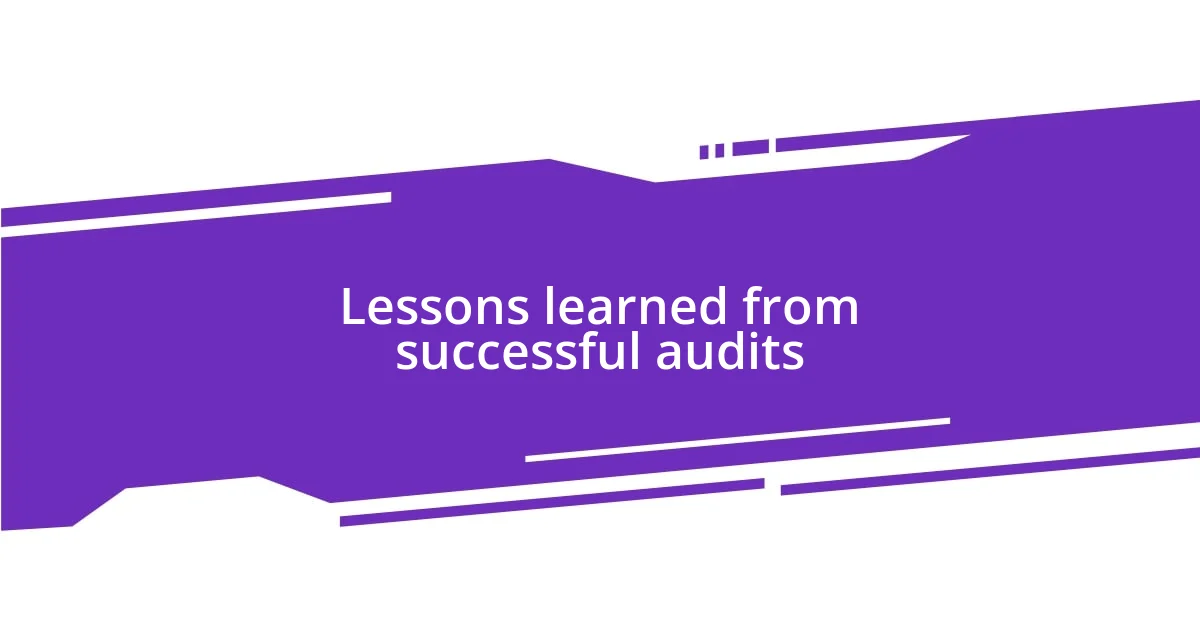
Lessons learned from successful audits
Successful audits have taught me that thorough preparation is key. I remember one particular audit where we dedicated extra time to review our compliance materials. The sense of satisfaction when everything was organized and in its place was palpable. It not only boosted our confidence but also impressed the auditors, who appreciated the clarity of our submissions. Have you ever felt that rush of relief when you know you’re ready?
Another insight I gained is the power of teamwork. During a challenging audit, we had an open brainstorming session where everyone contributed ideas on how to streamline processes. The collaborative spirit transformed what initially felt like a stressful experience into a rewarding one. It reinforced my belief that diverse perspectives lead to innovative solutions. Isn’t it amazing how a shared goal can unite a team?
Lastly, maintaining an adaptable mindset has proven invaluable. I recall a moment when unexpected findings arose during an audit; instead of panicking, we leaned into the challenge. By being flexible and open to adjusting our plans, we turned what could have been a setback into an opportunity for growth and improvement. How often do we allow ourselves to pivot and embrace new directions? Each audit experience has reinforced this lesson: adaptability paves the way to success.












